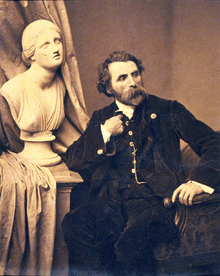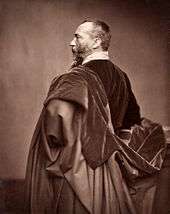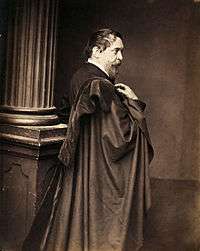Antoine Samuel Adam-Salomon
| Antoine Samuel Adam-Salomon | |
|---|---|
 Self-portrait, c. 1860 | |
| Born |
9 January 1818 La Ferté-sous-Jouarre, Seine-et-Marne, France |
| Died |
28 April 1881 (aged 63) Paris, France |
| Resting place | Fontainebleau |
| Other names | Exhibited in the Salon as "Adama" (1844 and 1848). |
| Occupation | Sculptor, Portrait Photographer |
| Organization | Société Française de Photographie |
| Religion | Judaism |
| Spouse(s) | Georgine Cornélie Coutellier |
| Awards | Légion d’honneur, 1870 |
Antoine Samuel Adam-Salomon (9 January 1818 – 28 April 1881 [1]) was a French sculptor and photographer.
Early career
Antoine Samuel Adam-Salomon was born to a French Jewish family on 9 January 1818 in La Ferté-sous-Jouarre, Seine-et-Marne, France. Following a brief career as a modeler for the Jacob Petit pottery factory in Fontainebleau, he received a scholarship to study sculpture in Paris. He also traveled for studies to Switzerland and England.[2] His notable sculptures include busts of Victor Cousin, Odilon Barrot, Pierre-Jean de Béranger, Alphonse de Lamartine, Gioachino Rossini, and Marie Antoinette.[3]
Photography
After becoming established as a sculptor, Adam-Salomon studied photography under the portraitist Franz Hanfstaengl in Munich in 1858. He became a leading portrait photographer. Adam-Salomon returned to Paris where he opened a portrait studio in 1859; in 1865 he opened a second Paris studio.[4] In 1870 Adam-Salomon was made a member of the Société française de photographie and received the Légion d’honneur the same year.[5] Adam-Salomon's portrait photographs were considered to be among the best existing works during his lifetime, and were renowned for their chiaroscuro produced by special lighting techniques.[6]
Acceptance of photography as art
The photography of Adam-Salomon played a pivotal role in the mainstream acceptance of photography as an art form. For example, in 1858 the poet Alphonse de Lamartine described photography as "this chance invention which will never be art, but only a plagiarism of nature through a lens." A short time later, after seeing the photographs by Adam-Solomon, Lamartine changed his opinion.[7]
Critical praise
Coverage of Salomon's work in the French press outnumbered that of Félix Nadar by a ratio of ten to one. After the Paris Exposition of 1867, the reviewer for The Times (UK) described Salomon's pictures "matchless", "beyond praise," "the finest photographic portraits in the world."[8]
In the 1868 edition of the British Journal of Photography Almanac, editor J. Traill Taylor wrote:
The important discovery of the past year has been that M. Adams-Salomon, a Parisian photographer, has produced portraits of so high class as to show us the true capabilities of photography, and how much we have yet to overcome ere similar perfection can be claimed for the works of our average artists. It is far from being pleasant to know that we are so far behind the Parisians; but, believing such to be the case, the knowledge of the fact will, without doubt, rouse English artists to a sense of their shortcomings and the particular direction in which progress must be made.[9]
Selected works
-

Philosophe
-

Alphonse Karr, French critic, journalist and novelist.
-

Charles Garnier, French architect.
-

Lajos Kossuth, Hungarian politician and revolutionary.
-

Labeled as "General Giroflore", identity unknown.
Notes
References
- Berlioz, Hector; Braam, Gunther; Macnutt, Richard (1967). New Edition of the Complete Works. 26. Bärenreiter. p. 139. ISBN 978-3-7618-1677-6. Retrieved 2010-10-10.
- Buerger, Janet E. (1989). International Museum of Photography at George Eastman House, eds. French Daguerreotypes. University of Chicago Press. pp. 56–59. ISBN 978-0-226-07985-1. Retrieved 2010-10-10.
- Hannavy, John (2008). Encyclopedia of Nineteenth-century Photography. 1. CRC Press. p. 6. ISBN 978-0-415-97235-2. Retrieved 2010-10-10.
- Jay, Martin (1994). Downcast eyes: the denigration of vision in twentieth-century French thought. University of California Press. p. 138. ISBN 978-0-520-08885-6. Retrieved 2010-10-10.
- Taylor, J. Traill (1868). The British Journal of Photography Almanac (PDF). London: Henry Greenwood. p. 6. Retrieved 2010-10-10.
- Turner, Jane, ed. (1996). "Adam-Salomon, Antoine-Samuel". Grove Dictionary of Art. Oxford, England: Oxford University Press. Retrieved 2010-10-10.
- "Union List of Artist Names". J. Paul Getty Trust. Retrieved 2010-10-10.
- Waters, Clara Erskine Clement; Hutton, Laurence (1879). Artists of the nineteenth century and their works: A handbook containing two thousand and fifty biographical sketches. 1. Boston: Houghton, Osgood & Co. Retrieved 2010-10-10.
- Weill, Julien (1906). "Adam-Salomon, Antony Samuel". In Isidore Singer, Ph.D. Jewish Encyclopedia. New York, New York: Funk & Wagnalls. p. 184. Retrieved 2010-10-10.
External links
| Wikimedia Commons has media related to Antoine Samuel Adam-Salomon. |
- Philadelphia Museum of Art collection of 65 Adam-Salomon photographs
- Adam-Salomon's bust sculptures of Elisabeth of Bavaria at Sotheby's, and Edwin Chadwick at National Portrait Gallery
- Antoine Samuel Adam-Salomon in American public collections, on the French Sculpture Census website
